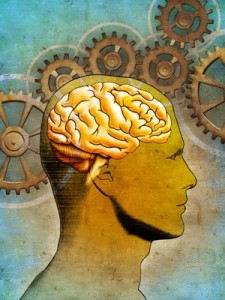Part 2 of a 4-Part Series on Adult ADHD
This is the second article in a four-part series on Adult ADHD. In my previous article, “Adult ADHD – Fact versus Fiction,” I looked at some basic questions that people frequently ask about ADHD. This article continues that discussion by looking at the importance of an evaluation, what to expect, and what it should and should not include.
What Does an ADHD Evaluation Involve?
![JULIES-7658181994_61844113f6_k[Conflict]](https://millcreekchristiancounseling.com/wp-content/uploads/2014/10/JULIES-7658181994_61844113f6_kConflict-200x300.jpg) When an adult feels that there is a possibility that they may have ADHD, the next step is often to have an evaluation for the condition. A typical evaluation will involve an office visit with their medical doctor, or psychiatrist, as well as with a trained mental health provider, such as a clinical psychologist. The doctor or mental health provider should have specialized training regarding how the brain works, as well as training in how to identify different conditions, such as ADHD. Mental health providers may include clinical psychologists, who may have specialized experience in health psychology and/or neuropsychology. During the evaluation, the patient and the specialist will sit down and discuss symptoms and how these are impacting day to day functioning at home, at school, or at work. The specialist will ask specific questions in order to conduct a thorough evaluation, make an accurate diagnosis, and develop an effective treatment plan. Trained medical and mental health providers can easily make this diagnosis based on the information gathered during the appointment, which may include reviewing recent lab work from an annual physical exam. An ADHD evaluation does not typically involve brain scans. This practice is frowned upon by the American Medical Association, the American Academy of Pediatrics, and the American Psychological Association as it is unnecessary and expensive.
When an adult feels that there is a possibility that they may have ADHD, the next step is often to have an evaluation for the condition. A typical evaluation will involve an office visit with their medical doctor, or psychiatrist, as well as with a trained mental health provider, such as a clinical psychologist. The doctor or mental health provider should have specialized training regarding how the brain works, as well as training in how to identify different conditions, such as ADHD. Mental health providers may include clinical psychologists, who may have specialized experience in health psychology and/or neuropsychology. During the evaluation, the patient and the specialist will sit down and discuss symptoms and how these are impacting day to day functioning at home, at school, or at work. The specialist will ask specific questions in order to conduct a thorough evaluation, make an accurate diagnosis, and develop an effective treatment plan. Trained medical and mental health providers can easily make this diagnosis based on the information gathered during the appointment, which may include reviewing recent lab work from an annual physical exam. An ADHD evaluation does not typically involve brain scans. This practice is frowned upon by the American Medical Association, the American Academy of Pediatrics, and the American Psychological Association as it is unnecessary and expensive.
Conditions That Can Be Confused with ADHD
 As part of a standard work-up for ADHD, your specialist will rule out the following conditions. These are conditions that often mimic ADHD, as they may also cause similar symptoms.
As part of a standard work-up for ADHD, your specialist will rule out the following conditions. These are conditions that often mimic ADHD, as they may also cause similar symptoms.
- Head injury and lead toxicity. These are the most common causes of acquired inattention and problems with executive function (executive function will be discussed further in the following article in this series).
- Seizure disorders, which can be mistaken for the inattention caused by ADHD (and their treatment can impair focus, working memory, and short term memory).
- Sleep disorders, which can result in inattention. These include sleep deprivation, narcolepsy, or obstructive sleep apnea (OSA). OSA may result in impaired focus and attention, impaired working memory and short term memory, slowed processing speed, decreased verbal fluency, and impaired executive function. However, once identified it is very treatable.
- Endocrine disorders, such as hypothyroidism, which can result in cognitive slowing, memory, and concentration problems, while hyperthyroidism may result in irritability.
- Lyme’s disease may be considered (Wasserstein, Wolf, Solanto, Marks, and Simkowitz, 2008).
- B-12 deficiency, which may occur for different reasons, and which is easily treated. As a chronic deficiency it can result in neuropathy (painful and deadened nerves in the hands and feet) or cognitive and memory problems.
- After-effects of Chemotherapy or Open Heart Surgery, which can occur for some people.
- Medications that can impair short term memory (benzodiazepines, Ambien, or Gabapentin, for example).
- Depression, which can cause a mental and physical slowing, and result in distraction and forgetfulness.
- PTSD and high levels of anxiety, which can make it difficult to focus.
- Marijuana use, as frequent use may result in short term memory impairment and problems with executive function.
- Use of drugs such as Methamphetamine, which can cause a person to appear to be very restless, in constant movement, impatient, and intense.
- Very slow recovery from anesthesia after surgery. (If recovery from anesthesia takes days to weeks, this may be an indicator of a health condition and should be evaluated further with neuropsychological testing). (Wasserstein, Wolf, Solanto, Marks, and Simkowitz, 2008)
Take a Quiz for ADHD Symptoms
 In the section below, you can take a brief quiz to find out if you or someone you love shows signs of ADHD and would benefit from an in-depth evaluation, treatment plan, and some strategic coaching so that you or your loved can one reach the full potential God has designed you for. In the section below, you can take a brief quiz to find out if you or someone you love shows signs of ADHD and would benefit from an in-depth evaluation, treatment plan, and some strategic coaching so that you or your loved can one reach the full potential God has designed you for. If the symptoms in the quiz below describe you, the next step is to complete an ADHD evaluation with a qualified mental health professional.
In the section below, you can take a brief quiz to find out if you or someone you love shows signs of ADHD and would benefit from an in-depth evaluation, treatment plan, and some strategic coaching so that you or your loved can one reach the full potential God has designed you for. In the section below, you can take a brief quiz to find out if you or someone you love shows signs of ADHD and would benefit from an in-depth evaluation, treatment plan, and some strategic coaching so that you or your loved can one reach the full potential God has designed you for. If the symptoms in the quiz below describe you, the next step is to complete an ADHD evaluation with a qualified mental health professional.
Part A
- Often fails to give close attention to details or makes careless mistakes in schoolwork, at work, or with other activities.
- Often has trouble holding attention on tasks or play activities.
- Often does not seem to listen when spoken to directly.
- Often does not follow through on instructions and fails to finish schoolwork, chores, or duties in the workplace (e.g. loses focus, is side-tracked).
- Often has trouble organizing tasks and activities.
- Often avoids, dislikes, or is reluctant to do tasks that require mental effort over a long period of time (such as schoolwork or homework).
- Often loses things necessary for tasks and activities (e.g. school materials, pencils, books, tools, wallets, keys, paperwork, eyeglasses, mobile telephones).
- Is often easily distracted.
- Is often forgetful in daily activities.
Part B
- Often fidgets with or taps hands or feet, or squirms in seat.
- Often leaves seat in situations when remaining seated is expected.
- Often runs about or climbs in situations where it is not appropriate (adolescents or adults may be limited to feeling restless).
- Often unable to play or take part in leisure activities quietly.
- Is often “on the go” acting as if “driven by a motor.”
- Often talks excessively.
- Often blurts out an answer before a question has been completed.
- Often has trouble waiting his/her turn.
- Often interrupts or intrudes on others (e.g. butts into conversations or games).
If you identified having more than five symptoms on either Part A or Part B, you may want to consider scheduling an evaluation.
Christian Counseling for Adult ADHD
The following articles in this series will continue this discussion of Adult ADHD. However, if you have further questions about it, you may want to consider speaking to an appropriately trained Christian counselor. I am a trained clinical psychologist who specializes in health psychology and neuropsychological assessment. This enables me to provide qualified and thorough evaluations. I will work closely with you and your medical provider to accurately diagnose ADHD, or to identify other possible causes that may contribute to your symptoms. As a Christian counselor, I will be happy to guide treatment planning, discuss life skills, and help you to develop strategies that will assist you to compensate for challenges related to ADHD. I also provide educational and career coaching, and support for improving communication and relationships impacted by ADHD.
References
For a complete listing of references for the information found in the articles of this four-part series, click here.
Photos
“Working Outside,” by of CollegeDegrees360 Flickr CreativeCommons (CC BY-SA 2.0); “Thinking Brain,” Image ID: 2510460, by Andreus, on Depositphotos; “Bored Businesswoman Sleeping in a Meeting,” by: AndreyPopov, Depositphotos, Image ID: 18597227




